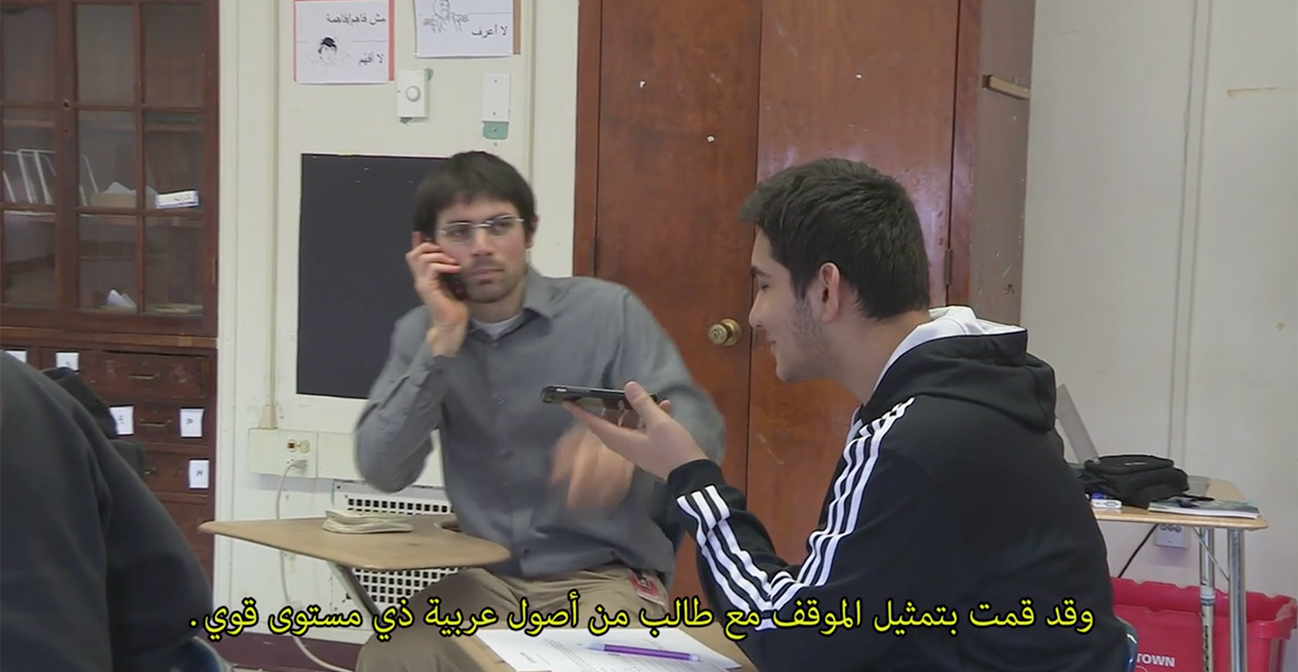Join us for conversations that inspire, recognize, and encourage innovation and best practices in the education profession.
Available on Apple Podcasts, Spotify, Google Podcasts, and more.

CLASSROOM AT A GLANCE
Teacher
Eric Bartolotti
Language
Arabic I
Grades
9 and 11
School
Watertown High School, Watertown, Massachusetts
Lesson Date
April 13
Class Size
10
Schedule
1 hour, 4–5 days per week
اضغط هنا للترجمة باللغة العربية
In this lesson, high school students demonstrate their ability to use basic greetings and express likes and dislikes through a role-playing activity. To start, Mr. Bartolotti reviews with students what they have been learning in this unit and explains the day’s planned activity. Next, students arrange their desks in two rows and pair off, assuming the roles of telemarketers and prospective customers. During a simulated phone call, telemarketers must politely greet customers and then try to sell their products. Students change partners, and once all students have spoken with each other, the class determines the best telemarketer according to criteria Mr. Bartolotti has set. To wind down and end on a relaxed note, students vote on a song to sing as a class before leaving.
Standards Addressed
Communication: Interpersonal
heritage speaker
A heritage speaker is a student who is exposed to a language other than English at home. Heritage speakers can be categorized based on the prominence and development of the heritage language in the student’s daily life. Some students have full oral fluency and literacy in the home language; others may have full oral fluency but their written literacy was not developed because they were schooled in English. Another group of students — typically third- or fourth-generation — can speak to a limited degree but cannot express themselves on a wide range of topics. Students from any of these categories may also have gaps in knowledge about their cultural heritage. Teachers who have heritage speakers of the target language in their class should assess which proficiencies need to be maintained and which need to be developed further. See also native speaker.
informal assessment
During an informal assessment, a teacher evaluates students’ progress while they are participating in a learning activity, for example, a small-group discussion. Results are typically used to make decisions about what to do next, namely, whether the students are ready to move on or whether they need more practice with the material.
role-playing
Role-playing is an activity in which students dramatize characters or pretend that they are in new locations or situations. This activity challenges students by having them use language in new contexts.
Reflect on Your Practice
As you reflect on these questions, write down your responses or discuss them as a group.
Watch Other Videos
Watch other videos in the Teaching Foreign Languages K–12 library for more examples of teaching methodologies like those you’ve just seen. Note: All videos in this series are subtitled in English.
Put It Into Practice
Try these ideas in your classroom. Where it’s not already evident, reflect on how to adapt an idea that targets one performance range for application to other performance ranges.
World-Readiness Standards for Learning Languages
The World-Readiness Standards for Learning Languages create a roadmap to guide learners to develop competence to communicate effectively and interact with cultural understanding. This lesson correlates to the following Standards:
Interpersonal Communication
Lesson Materials
اضغط هنا للترجمة باللغة العربية
Telemarketing Activity—Conversation Exercise (PDF)
Instructions for completing the conversational activity featured in the classroom video, including worksheets for both the telemarketer and the person receiving the call to complete during the conversation.
Telemarketing Homework (PDF)
Instructions for work to be completed prior to the classroom activity, including “telemarketer training” information and a company information sheet.
Arabic fruit song
A YouTube video of the song students sing at the end of the class.
Curriculum References
Massachusetts Foreign Language Curriculum Framework (Aug. 1999)
Eric Bartolotti’s Additional Resources
Print Resources:
Standish, Sarah, Richard Cozzens, and Rana Abdul-Aziz. Jusoor: Beginning Arabic for High School (tentative title). Washington, DC: Georgetown University Press, forthcoming.